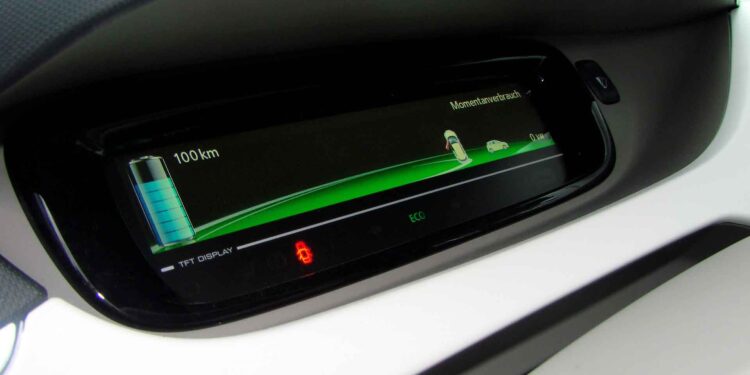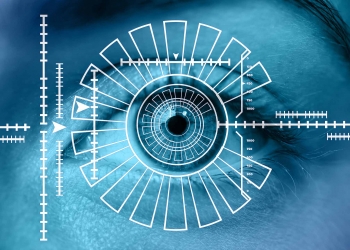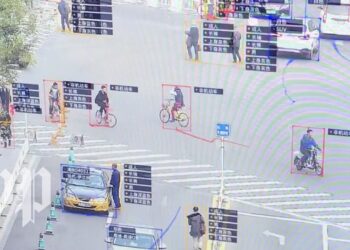Commission approved a new pan-European battery project to invest on batteries, support research and innovation in the battery value chain. European Commission has approved a second Important Project of Common European Interest (IPCEI). The project, called “European Battery Innovation” was jointly prepared and notified by Austria, Belgium, Croatia, Finland, France, Germany, Greece, Italy, Poland, Slovakia, Spain and Sweden.
The twelve Member States will provide up to €2.9 billion in funding in the coming years. The public funding is expected to unlock an additional €9 billion in private investments, i.e. more than three times the public support. The project complements the first IPCEI in the battery value chain that the Commission approved in December 2019.
Competition policy works hand in hand with innovation and competitiveness
Executive Vice-President Margrethe Vestager, in charge of competition policy, said: “For those massive innovation challenges for the European economy, the risks can be too big for just one Member State or one company to take alone. So, it makes good sense for European governments to come together to support industry in developing more innovative and sustainable batteries. Today’s project is an example of how competition policy works hand in hand with innovation and competitiveness. By enabling breakthrough innovation while ensuring that limited public resources are used to crowd in private investment and that competition distortions are minimised. With significant support also comes responsibility: the public has to benefit from its investment, which is why companies receiving aid have to generate positive spillover effects across the EU.”
EU invests in next generation of batteries
Vice-President Maroš Šefčovič, in charge of the European Battery Alliance, said: “Thanks to its focus on a next generation of batteries, this strong pan-European project will help revolutionise the battery market. It will also boost our strategic autonomy in a sector vital for Europe’s green transition and long-term resilience. Some three years ago, the EU battery industry was hardly on the map. Today, Europe is a global battery hotspot. And by 2025, our actions under the European Battery Alliance will result in an industry robust to power at least six million electric cars each year. Our success lies in collaboration, with some 300 partnerships between industrial and scientific actors foreseen under this project alone.”
Commissioner for Internal Market Thierry Breton said: ‘“The batteries value chain plays a strategic role in meeting our ambitions in terms of clean mobility and energy storage. By establishing a complete, decarbonised and digital battery value chain in Europe, we can give our industry a competitive edge, create much needed jobs and reduce our unwanted dependencies on third countries – in short, make us more resilient. This new IPCEI proves that the European Battery Alliance, an important part of the EU industrial policy toolbox, is delivering.”
Invest on raw materials, design and manufacturing
The project will cover the entire battery value chain from extraction of raw materials, design and manufacturing of battery cells and packs, and finally the recycling and disposal in a circular economy, with a strong focus on sustainability. It is expected to contribute to the development of a whole set of new technological breakthroughs, including different cell chemistries and novel production processes, and other innovations in the battery value chain, in addition to what will be achieved thanks to the first battery IPCEI.
Europe secures the supply of EU Raw Materials
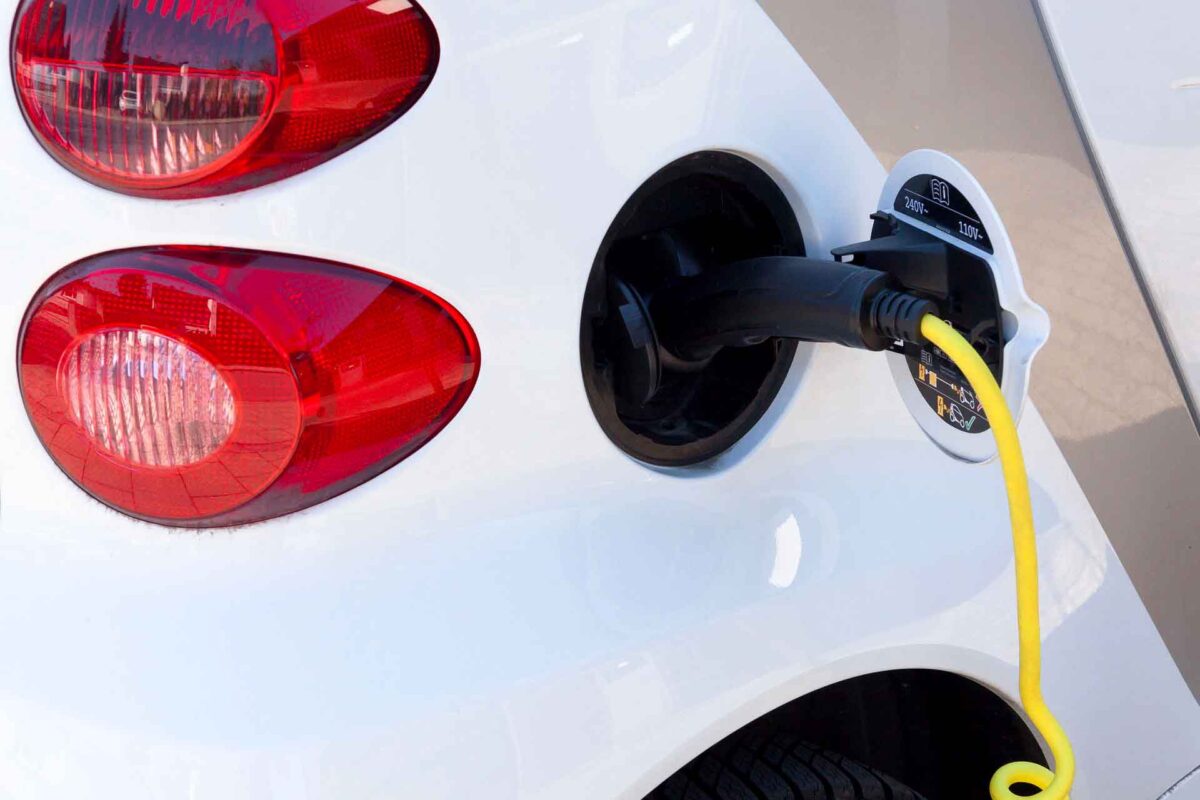
“For those massive innovation challenges for the European economy, the risks can be too big for just one member state or one company to take alone,” European Competition Commissioner Margrethe Vestager told. “So, it makes good sense for European governments to come together to support industry in developing more innovative and sustainable batteries,” she said.
State aid rules offer Member States many possibilities to support the necessary research and innovation. In recent years, those have enabled more than 10 billion euros per year in public support. But for those massive innovation challenges for the European economy, the risks can be too big for just one Member State or one company to take alone. So, it makes good sense for European governments to come together to support industry in developing more innovative and sustainable batteries. Especially when the resulting innovation can benefit the entire European economy.
EU Commission assessment
The Commission assessed the proposed project under EU State aid rules, more specifically its Communication on Important Projects of Common European Interest (IPCEI). Where private initiatives supporting breakthrough innovation fail to materialise because of the significant risks such projects entail, the IPCEI State aid Communication enables Member States to jointly fill the gap to overcome these market failures, while ensuring that the EU economy at large benefits and limiting potential distortions to competition.
Important Project of Common European Interest (IPCEI)
The Commission has found that the proposed IPCEI fulfils the required conditions set out in its Communication. In particular, the Commission concluded that:
- Project contributes to a common objective by supporting a strategic value chain for the future of Europe in particular with respect to clean and low emission mobility.
- The project is highly ambitious, as it aims at developing technologies and processes that go beyond current technology and will allow major improvements in performance, safety and environmental impact.
- The plan also involves significant technological and financial risks, and public support is therefore necessary to provide incentives to companies to carry out the investment.
- Aid to individual companies is limited to what is necessary, proportionate and does not unduly distort competition. In particular, the Commission has verified that the total planned maximum aid amounts are in line with the eligible costs of the projects and their funding gaps. Furthermore, if large projects covered by the IPCEI turn out to be very successful, generating extra net revenues, the companies will return part of the aid received to the respective Member States (claw-back mechanism).
- The results of the project will be widely shared by participating companies benefitting from the public support with the European scientific community and industry beyond the participating companies and countries. As a result, positive spill-over effects will be generated throughout Europe.
On this basis, the Commission concluded that the project is in line with EU State aid rules.
EU Funding, beneficiaries and amounts
The project will involve 42 direct participants, including small and medium-sized enterprises (SMEs) and start-ups with activities in one or more Member States. The direct participants will closely cooperate with each other through nearly 300 collaborations envisaged, and with over 150 external partners, such as universities, research organisations and SMEs across Europe. The overall project is expected to be completed by 2028 (with differing timelines for each sub-project).
Companies eligible for funding include ACI Systems, Alumina Systems, BMW, Cellforce Group, ElringKlinger, Liofit, Manz, Northvolt, SGL Carbon, Skeleton Technologies and Tesla.
The direct participants, the Member States supporting them and the different project areas are as follows:
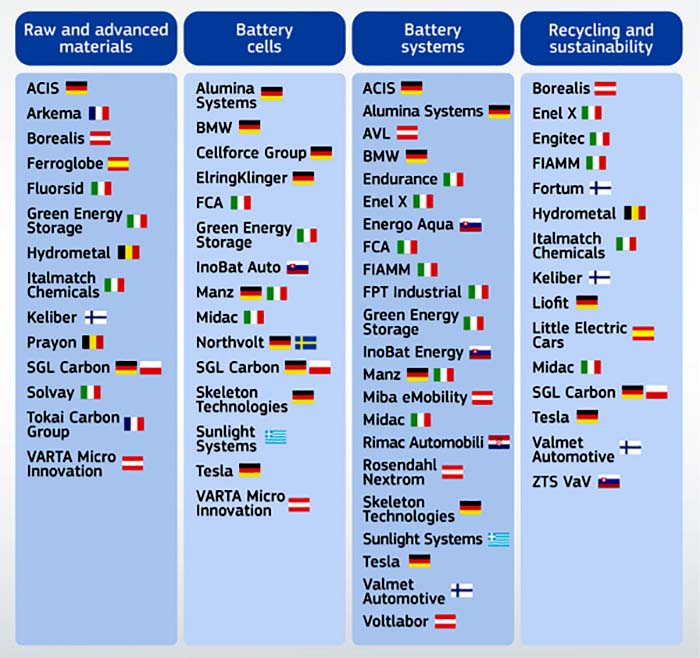
European Battery Alliance
The Commission’s approval of this project forms part of the context of the wider Commission efforts to support the development of an innovative and sustainable European battery industry. In 2017, the Commission launched the European Battery Alliance. The Commission also adopted in 2018 the Strategic Action Plan for Batteries and has promoted a wide range of initiatives as part of the plan.
In view of the growing importance of batteries in a number of areas, including notably transport and energy, a safe, circular and sustainable battery value chain will be increasingly essential. Having batteries that are more sustainable throughout their life cycle is key to achieve our ambitious climate targets. This is also at the core of the Sustainable Batteries Regulation proposed by the Commission in December 2020.
EU reaffirms commitment to Battery industry to boost Green Recovery
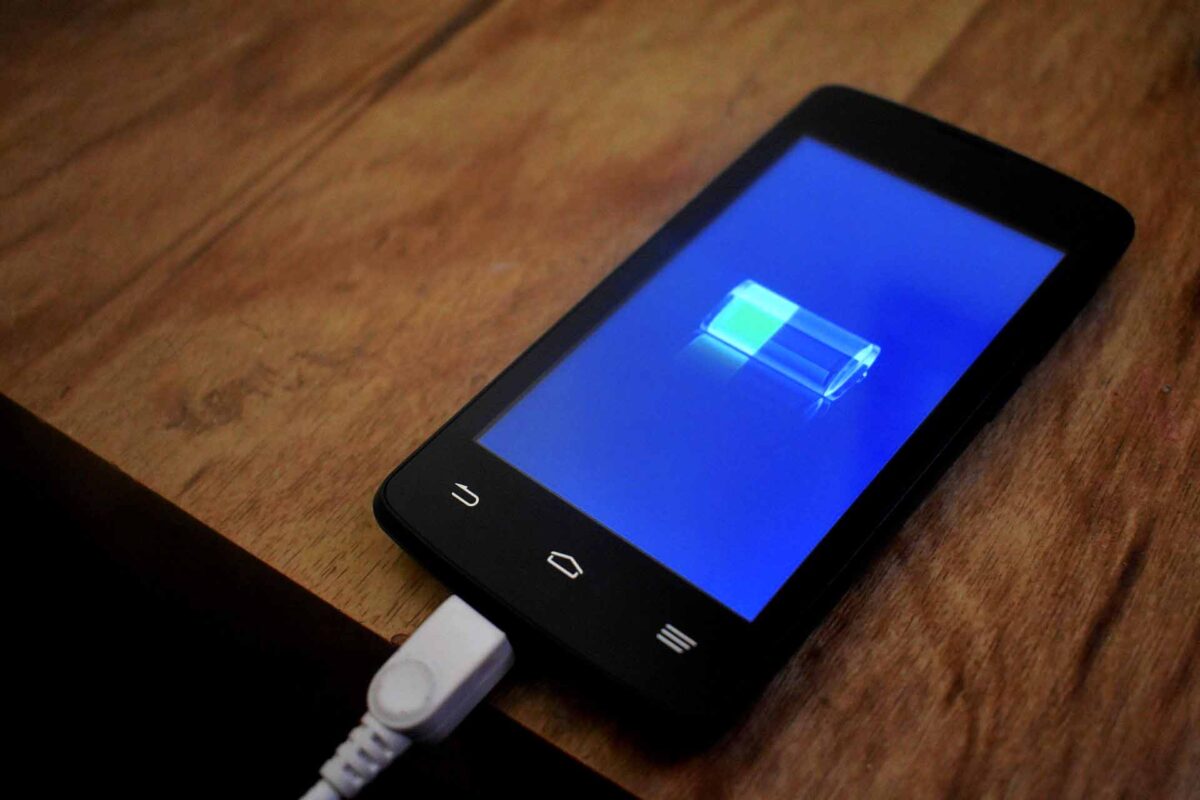
This decision is the third research and innovation project based on the 2014 State aid Communication on Important Projects of Common European Interest (IPCEI), setting out criteria under which several Member States can support transnational projects of strategic significance for the EU under Article 107(3)(b) of the Treaty on the Functioning of the European Union (TFEU). The Communication aims to encourage Member States to support highly innovative projects that make a clear contribution to economic growth, jobs and competitiveness.
Important Project of Common European Interest (IPCEI) Communication
The IPCEI Communication complements other State aid rules such as the General Block Exemption Regulation and the Research, Development and Innovation (R&D&I) Framework, which allows supporting innovative projects whilst ensuring that potential competition distortions are limited. According to the 2019 State Aid Scoreboard, annual spending for R&D&I under the General Block Exemption Regulation continued to increase to reach about €10 billion in 2018.
The IPCEI Communication supports investments for R&D&I and first industrial deployment on condition that the projects receiving this funding are highly innovative and do not cover mass production or commercial activities. They also require extensive dissemination and spillover commitments of new knowledge throughout the EU and a detailed competition assessment to minimise any undue distortions in the internal market.

